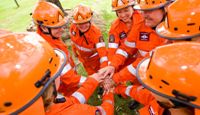Page Navigation
SES
Somerset Region SES Unit
One of the primary disaster management tools available to the community is its local State Emergency Service (SES) unit. The Somerset Region SES Unit consists of community-minded citizens, between the ages of 16 and 65, who offer their time to train as volunteers in various fields of expertise to serve their community in times of disaster and emergency. More information on the SES can be found at https://www.qfes.qld.gov.au/about-us/frontline-services/state-emergency-service.

The Local SES Unit
The Somerset Region SES Unit (originally the Esk Shire SES Unit) was formed in 1978 with two SES groups, Lowood and Toogoolawah/Esk. Subsequently, a separate Esk Group was established. Following the amalgamation of the shires of Esk and Kilcoy, the Kilcoy SES Group became the fourth within this Unit.
Members of the Esk, Kilcoy, Lowood and Toogoolawah Groups are drawn from a wide cross-section of the community bringing with them a range of skills and experience.
Training
These members are encouraged to increase their skills in specialised areas of training and can elect to undergo accredited training in the areas of:
- Instruction and assessment;
- Leadership and mentoring;
- Incident management;
- Land Search and Rescue;
- Flood Rescue;
- Storm and Water Damage Operations;
- Traffic Control and Road Crash Rescue Support; and
- Chainsaw Operations.
Operations
SES members are called on to assist other emergency services and statutory bodies involved in response to:
- floods - to transport persons, medical needs, groceries etc. to isolated areas
- storms - to carry out temporary repairs to storm-damaged residences
- search and rescue - to locate, extricate and recover missing or trapped persons
- bushfires - to coordinate operations and provide field communication facilities
- road crashes - to secure the accident scene, control traffic, provide emergency lighting and assist with the extrication of injured persons.
Equipment
A wide range of equipment is supplied by Federal, State and Local Government as well as local support bodies including service clubs and the respective SES groups' financial support and social clubs.
Members are issued with an extensive 'kit' of personal protective equipment.
Each group trains in the use of four-wheel drive vehicles, flood boats, radio communication equipment, emergency power generators and lighting, general rescue gear, hydraulic cutting gear, and basic first aid and field craft equipment.
